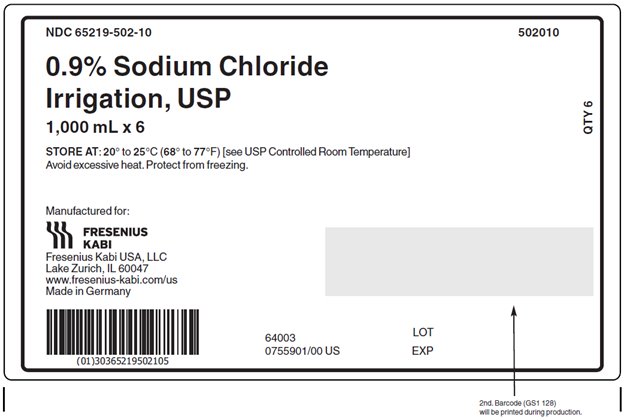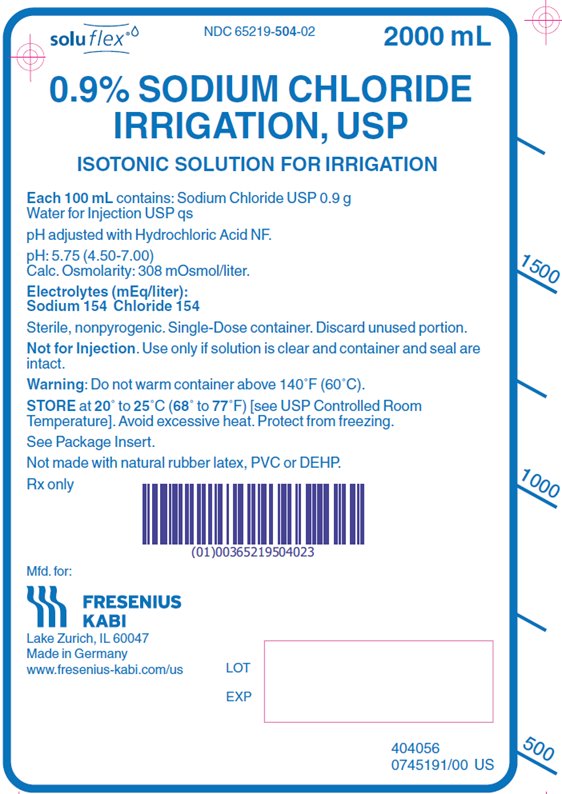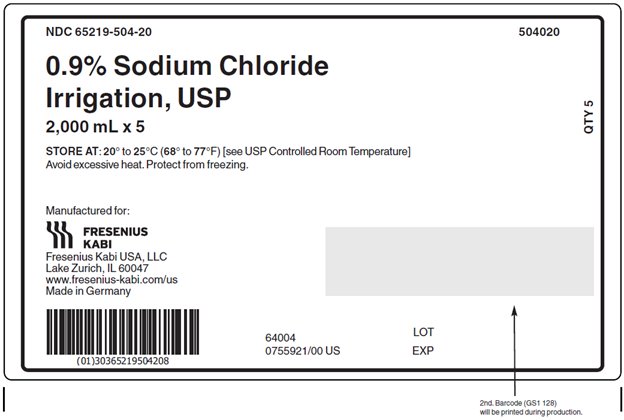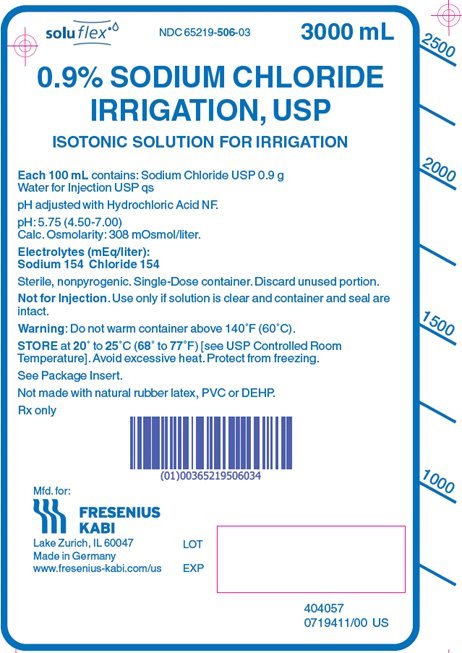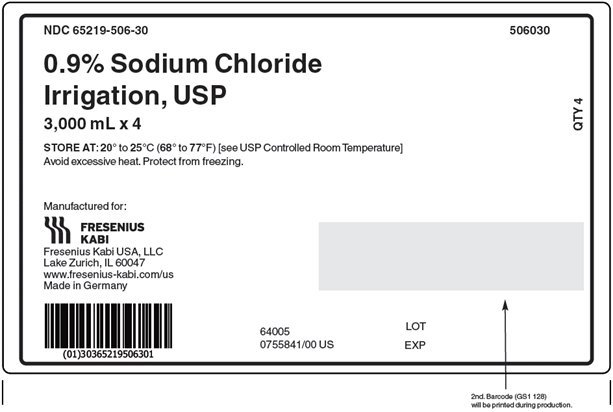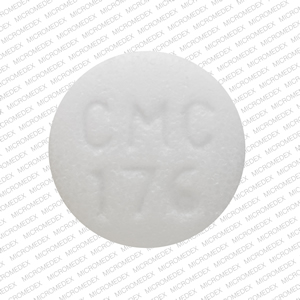Sodium Chloride Irrigation: Package Insert / Prescribing Info
Package insert / product label
Dosage form: irrigation
Drug classes: Minerals and electrolytes, Miscellaneous respiratory agents
Medically reviewed by Drugs.com. Last updated on Apr 7, 2025.
On This Page
0.9% Sodium Chloride Irrigation, USP
Isotonic Solution for Irrigation.
For Irrigation Only.
Not for Injection.
Rx only
Sodium Chloride Irrigation Description
Each 100 mL contains:
Sodium Chloride, USP 0.9 g; Water for Injection, USP qs pH adjusted with Hydrochloric Acid, NF
pH: 5.75 (4.50-7.00)
Calculated Osmolarity: 308 mOsmol/liter
Concentration of Electrolytes (mEq/liter): Sodium 154; Chloride 154
0.9% Sodium Chloride Irrigation, USP is sterile, nonpyrogenic, isotonic and contains no bacteriostatic or antimicrobial agents.
The formula of the active ingredient is:
|
Ingredient |
Molecular Formula |
Molecular Weight |
|
Sodium Chloride, USP |
NaCl |
58.44 |
The flexible plastic container is made from a multilayered film specifically developed for parenteral drugs. It contains no plasticizers. The solution contact layer is a copolymer of ethylene and propylene. The container is nontoxic and biologically inert.
The container-solution unit is a closed system and is not dependent upon entry of external air during administration.
Not made with natural rubber latex, PVC or DEHP.
Sodium Chloride Irrigation - Clinical Pharmacology
0.9% Sodium Chloride Irrigation is utilized for a variety of clinical indications such as sterile irrigation of body cavities, tissues or wounds, indwelling urethral catheters, surgical drainage tubes, and for washing, rinsing or soaking surgical dressings, instruments and laboratory specimens. It also serves as a diluent or vehicle for drugs used for irrigation or other pharmaceutical preparations.
0.9% Sodium Chloride Irrigation provides an isotonic saline irrigation identical in composition with 0.9% Sodium Chloride Injection (normal saline).
Physiological irrigation solutions are considered generally compatible with living tissues and organs.
Sodium, the major cation of the extracellular fluid, functions primarily in the control of water distribution, fluid balance, and osmotic pressure of body fluids. Sodium is also associated with chloride and bicarbonate in the regulation of the acid-base equilibrium of body fluid.
Chloride, the major extracellular anion, closely follows the metabolism of sodium, and changes in the acid-base balance of the body are reflected by changes in the chloride concentration.
Indications and Usage for Sodium Chloride Irrigation
0.9% Sodium Chloride Irrigation is indicated for all general irrigation, washing, rinsing and dilution purposes which permit use of a sterile, nonpyrogenic electrolyte solution.
Contraindications
0.9% Sodium Chloride Irrigation is not for injection by usual parenteral routes.
An electrolyte solution should not be used for irrigation during electrosurgical procedures.
Warnings
FOR IRRIGATION ONLY. NOT FOR INJECTION.
Irrigating fluids have been demonstrated to enter the systemic circulation in relatively large volumes; thus, irrigation solutions must be regarded as systemic drugs.
Absorption of large amounts can cause fluid and/or solute overload resulting in dilution of serum electrolyte concentrations, overhydration, congested states or pulmonary edema.
The risk of dilutional states is inversely proportional to the electrolyte concentrations of the administered parenteral solutions. The risk of solute overload causing congested states with peripheral and pulmonary edema is directly proportional to the electrolyte concentration.
Do not warm container above 140°F (60°C).
After opening container, its contents should be used promptly to minimize the possibility of bacterial growth or pyrogen formation.
Discard unused portion of irrigating solution since it contains no preservatives.
Precautions
General
Use aseptic technique when preparing and administering sterile irrigation solutions. Use only if solution is clear and container and seal are intact.
Do not use for irrigation that may result in absorption of large amounts of fluid into the blood.
Caution should be observed when the solution is used for continuous irrigation or allowed to “dwell” inside body cavities because of possible absorption into the blood stream and the production of circulatory overload.
When used for irrigation via appropriate irrigation equipment, the administration set should be attached promptly. Unused portions should be discarded and a fresh container of appropriate size used for the start up of each cycle or repeat procedure. For repeated irrigations of urethral catheters, a separate container should be used for each patient.
Laboratory Tests
Clinical evaluation and periodic laboratory determinations are necessary to monitor changes in fluid balance, electrolyte concentrations, and acid-base balance after prolonged irrigation, when fluid absorption is suspected, or whenever the condition of the patient warrants such evaluation.
Drug Interactions
Some additives may be incompatible. Consult with pharmacist. When introducing additives, use aseptic technique. Mix thoroughly. Do not store.
Carcinogenesis, Mutagenesis, Impairment of Fertility
Studies with 0.9% Sodium Chloride Irrigation have not been performed to evaluate carcinogenic potential, mutagenic potential, or effects on fertility.
Pregnancy
Teratogenic Effects
Animal reproduction studies have not been conducted with 0.9% Sodium Chloride Irrigation. It is also not known whether 0.9% Sodium Chloride Irrigation can cause fetal harm when administered to a pregnant woman or can affect reproduction capacity. 0.9% Sodium Chloride Irrigation should be given to a pregnant woman only if clearly needed.
Labor and Delivery
Safety and effectiveness of 0.9% Sodium Chloride Irrigation during labor and delivery have not been established. Caution should be exercised, and the fluid balance, glucose and electrolyte concentrations, and acid-base balance, of both mother and fetus should be evaluated periodically or whenever warranted by the condition of the patient or fetus.
Nursing Mothers
It is not known whether this drug is excreted in human milk. Because many drugs are excreted in human milk, caution should be exercised when 0.9% Sodium Chloride Irrigation is administered to a nursing woman.
Pediatric Use
The safety and effectiveness of 0.9% Sodium Chloride Irrigation in pediatric patients have not been established. Its limited use in pediatric patients has been inadequate to fully define proper dosage and limitations for use.
Geriatric Use
Clinical studies of 0.9% Sodium Chloride Irrigation did not include a sufficient number of patients age 65 years and over to determine whether they respond differently from younger subjects. In general, dose selection for an elderly patient should be cautious, usually starting at the low end of the dosing range, reflecting the greater frequency of decreased hepatic, renal, or cardiac function, and of concomitant disease or other drug therapy.
This drug is known to be substantially excreted by the kidney, and the risk of toxic reactions to this drug may be greater in patients with impaired renal function. Because elderly patients are more likely to have decreased renal function, care should be taken in dose selection, and it may be useful to monitor renal function. Frequent laboratory determinations and clinical evaluations are recommended to monitor changes in blood glucose, electrolyte concentrations, and renal function.
Adverse Reactions/Side Effects
Possible adverse effects arising from the irrigation of body cavities, tissues, or indwelling catheters and tubes can be minimized when proper procedures are followed. Displaced catheters or drainage tubes can lead to irrigation or infiltration of unintended structures or cavities. Excessive volume or pressure during irrigation of closed cavities may cause undue distension or disruption of tissues. Accidental contamination from careless technique may transmit infection.
If an adverse reaction does occur, discontinue administration of the irrigant, evaluate the patient, institute appropriate therapeutic countermeasures, and save the remainder of the fluid for examination if deemed necessary.
To report SUSPECTED ADVERSE REACTIONS, contact Fresenius Kabi USA, LLC at 1-800-551-7176 or FDA at 1-800-FDA-1088 or www.fda.gov/medwatch.
Overdosage
In the event of overhydration or solute overload, reevaluate the patient's condition, and institute appropriate corrective treatment. Intravascular volume overload may respond to hemodialysis. See WARNINGS, PRECAUTIONS, and ADVERSE REACTIONS.
Sodium Chloride Irrigation Dosage and Administration
As required for irrigation.
When used as a diluent, or vehicle for other drugs, the drug manufacturer's recommendations should be followed.
Some additives may be incompatible. Consult with pharmacist. When introducing additives, use aseptic techniques. Mix thoroughly. Do not store.
Solutions should be inspected visually for particulate matter and discoloration prior to administration, whenever solution and container permits.
How is Sodium Chloride Irrigation supplied
0.9% Sodium Chloride Irrigation, USP is supplied sterile and nonpyrogenic in single-dose flexible plastic containers.
|
Product Code |
Unit of Sale |
Each |
|
502010 |
NDC 65219-502-10 |
NDC 65219-502-01 |
|
504020 |
NDC 65219-504-20 |
NDC 65219-504-02 |
|
506030 |
NDC 65219-506-30 |
NDC 65219-506-03 |
Exposure of pharmaceutical products to heat should be minimized. Avoid excessive heat. Protect from freezing. Store at 20° to 25°C (68° to 77°F) [see USP Controlled Room Temperature]; however, brief exposure up to 40°C (104°F) does not adversely affect the product.
Do not warm container above 140°F (60°C).
INSTRUCTIONS FOR USE:
Not for Injection. Not for use with pressurized irrigation systems.
Check solution container composition, lot number, and expiry date.
Irrigation solutions should be inspected visually for particulate matter and discoloration prior to administration, whenever solution and container permit.
Do not use if the solution is cloudy or precipitate is present.
Check the solution container for leaks by squeezing firmly. If leaks are found, discard.
The intact port cap provides visual tamper evidence. Do not use if port cap is prematurely removed. Maintain strict aseptic technique during handling.
To Add Medication:
- 1.
- Identify WHITE Additive Port with arrow pointing toward solution container.
- 2.
- Immediately before injecting additives, break off WHITE Additive Port Cap with the arrow pointing toward solution container.
- 3.
- Hold base of WHITE Additive Port.
- 4.
- Insert needle (18 – 23 gauge) through the center of the WHITE Additive Port's resealable septum and inject additives.
- 5.
- Mix solution container contents thoroughly.
- 6.
- WHITE additive port must be swabbed with disinfection agent before repuncturing.
- 7.
- Check admixture visually for particulate matter.
Preparation for Administration
- 1.
- Immediately before inserting the irrigation set, break off BLUE Administration Port Cap with the arrow pointing away from the solution container.
- 2.
- Use non-vented irrigation set or close the air-inlet on a vented set. Refer to directions for use accompanying the irrigation set.
- 3.
- Hold the base of the BLUE Administration Port, twist and push spike until fully inserted.
- 4.
- The BLUE Administration Port contains a self-sealing septum that helps prevent leakage after removing the spike. The Administration Port is not intended to be spiked more than once.
- 5.
- Suspend solution container from hanger hole.
- 6.
- For Single Use Only. Discard unused portion.
Manufactured for:
Lake Zurich, IL 60047
Made in Germany
www.fresenius-kabi.com/us
451818A
Revised: January 2025
PACKAGE LABEL – PRINCIPAL DISPLAY – 0.9% Sodium Chloride Irrigation, USP 1000 mL Bag Label
soluflex® NDC 65219-502-01 1000 mL
0.9% SODIUM CHLORIDE
IRRIGATION, USP
ISOTONIC SOLUTION FOR IRRIGATION
PACKAGE LABEL – PRINCIPAL DISPLAY – 0.9% Sodium Chloride Irrigation, USP 1000 mL Case Label
NDC 65219-502-10 502010
0.9% Sodium Chloride
Irrigation, USP
1,000 mL x 6
STORE AT: 20° to 25°C (68° to 77°F) [see USP Controlled Room Temperature]
Avoid excessive heat. Protect from freezing.
PACKAGE LABEL – PRINCIPAL DISPLAY – 0.9% Sodium Chloride Irrigation, USP 2000 mL Bag Label
soluflex® NDC 65219-504-02 2000 mL
0.9% SODIUM CHLORIDE
IRRIGATION, USP
ISOTONIC SOLUTION FOR IRRIGATION
PACKAGE LABEL – PRINCIPAL DISPLAY – 0.9% Sodium Chloride Irrigation, USP 2000 mL Case Label
NDC 65219-504-20 504020
0.9% Sodium Chloride
Irrigation, USP
2,000 mL x 5
STORE AT: 20° to 25°C (68° to 77°F) [see USP Controlled Room Temperature]
Avoid excessive heat. Protect from freezing.
| SODIUM CHLORIDE
sodium chloride injection, solution |
||||||||||||||||||||
|
||||||||||||||||||||
|
||||||||||||||||||||
|
||||||||||||||||||||
|
||||||||||||||||||||
|
||||||||||||||||||||
| SODIUM CHLORIDE
sodium chloride injection, solution |
||||||||||||||||||||
|
||||||||||||||||||||
|
||||||||||||||||||||
|
||||||||||||||||||||
|
||||||||||||||||||||
|
||||||||||||||||||||
| SODIUM CHLORIDE
sodium chloride injection, solution |
||||||||||||||||||||
|
||||||||||||||||||||
|
||||||||||||||||||||
|
||||||||||||||||||||
|
||||||||||||||||||||
|
||||||||||||||||||||
| Labeler - Fresenius Kabi USA, LLC (013547657) |
| Establishment | |||
| Name | Address | ID/FEI | Business Operations |
|---|---|---|---|
| Fresenius Kabi Deutschland GmbH | 506719546 | ANALYSIS(65219-502, 65219-504, 65219-506) , MANUFACTURE(65219-502, 65219-504, 65219-506) , API MANUFACTURE(65219-502, 65219-504, 65219-506) | |
Biological Products Related to sodium chloride
Find detailed information on biosimilars for this medication.
Frequently asked questions
More about sodium chloride
- Check interactions
- Compare alternatives
- Pricing & coupons
- Reviews (3)
- Drug images
- Latest FDA alerts (19)
- Side effects
- Drug class: minerals and electrolytes
Patient resources
Professional resources
- Sodium Chloride monograph
- Sodium Chloride 20% Injection (AHFS Monograph)
- Bacteriostatic Sodium Chloride (FDA)
- Sodium Chloride 0.45% Injection (FDA)
- Sodium Chloride Inhalation Solution (FDA)




